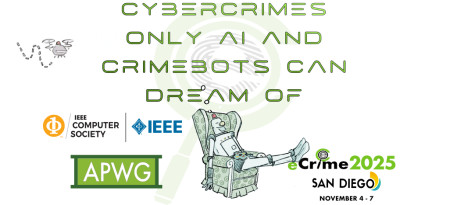APWG eCrime 2025 Symposium Expands Research Space to Include Cyber-Physical Threats Against People, Places and Critical Infrastructure
Pre-eminent Peer-Reviewed Cybercrime Conference Examines Physical Impact of Cybercrime Driven by AI Innovations -- Underwritten by a Newly Wealthy Criminal Culture

CAMBRIDGE, Mass., March 18, 2025 (Newswire.com) - The APWG Symposium on Electronic Crime Research (eCrime 2025) in San Diego on November 4-7 will solicit research on cybercrimes involving cyber-physical systems and operational technologies abused in the furtherance of any crime, an expanded scope that extends the symposium's focus from cyber (digital) crimes to include those manifesting abuse of physical spaces, commercial enterprises, scientific or military facilities, roadways, critical infrastructure and devices (e.g. IoT, electro-mechanical controllers, sensors, etc.).
APWG Secretary General Peter Cassidy said, "Cybercrime's consequences are increasingly playing out in physical spaces and, while financial consequences are fundamental, cybercrime today threatens national critical infrastructures and the interests of polities beyond home economics and enterprise finance. Most concerning with AI's emergence is the cashed-up cybercriminal culture with the R&D wherewithal of a developed nation that is ready to exploit the new tech for its most damaging innovations yet."
With the rise of cyber attacks inflicting physical damage - as exhibited in the Stuxnet attacks, the cyber incursions against the Ukrainian electrical grid a decade ago and the Colonial pipeline shutdown - as well as the rapid evolution of malware designed to manipulate SCADA and ICS process control technologies, APWG managers decided eCrime's scope had to be expanded once more to maintain relevance to the contemporary cyber threatscape.
Important Dates (papers):
Full Paper registration / submission of full draft due: July 15st, 2025
Notification of acceptance: August 30th, 2025
Conference: November 4 - 7, 2025
Camera-ready paper due: November 30th, 2025
This year's edition of eCrime is titled "Cybercrimes Only AI and Crimebots Can Dream Of". Solicited Topics Consonant With eCrime 2025's Theme Include:
Artificial Intelligence (AI) as criminal co-conspirator and defensive collaborator, such as:
-> Malicious AI agents employed to perform enhanced malware polymorphism, agentic spearphishing, reconnaissance, et
-> Development and maintenance of criminal co-pilots and the future of human-machine teaming, including hybridized human-crimebot cyber gangs.
-> Are malicious AI tools lowering the skills barrier to commit more advanced cybercrimes?
Adversarial AI (attacks directlyagainst AIs and machine learning systems) as it relates to the furtherance of cybercrime or cyber-physical cybercrime - especially agents employed in security operations
Defensive AI Agents deployed as cybersecurity operations managers and (autonomous and semi-autonomous) counter-cybercrime managers
Design, deployment and assessment of multi-agent environments (MAEs) for enhancing resilience of infrastructure and systems
Design, deployment and assessment of defences related to AI systems themselves (jailbreaks, injections, etc.)
Actual, emerging or potential risks from AI systems deployed to animate cybercrimes against people, operational systems, IoT technologies, or spaces and objects
Abuse of cyber-physical systems and operational technologies and downstream manipulation (extant, emerging or potential) for furtherance of crimes with physical manifestations, including:
-> Drone and robot hijacking and weaponization;
-> Criminal abuses and weaponization of medical and surgical systems;
-> Criminal abuses and weaponization of IoT for domestic and commercial targeting;
-> Criminal abuses and weaponization of autonomous vehicles and delivery robots
Source: ANTI-PHISHING WORKING GROUP
